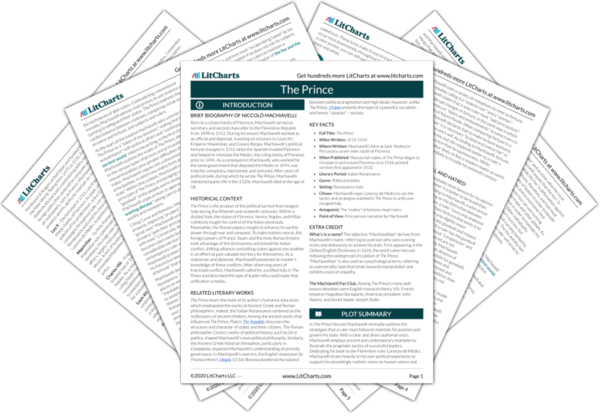Machiavelli regularly juxtaposes the masses, or "common people," against the ruling elite in The Prince. To justify his decision to write the book, Machiavelli invokes this class-based contrast, stating, "To comprehend fully the nature of princes one must be an ordinary citizen." As with other opposing pairs described in The Prince, Machiavelli argues that the two entities, while vastly different, rely on each other for mutual survival and understanding. The "friendship" of the people forms a central component of the prince's power, since the goodwill of the people guards the prince against conspiracies and allows the prince to raise formidable citizen armies. In return, the prudent prince protects the property and honor of his subjects, which also ensures his own survival. The people and the prince share a symbiotic relationship, although the masses hold the unique ability to crown and dethrone princes in certain circumstances.
The Masses and The Elite ThemeTracker

The Masses and The Elite Quotes in The Prince
Preface Quotes
Nor I hope will it be considered presumptuous for a man of low and humble status to dare discuss and lay down the law about how princes should rule; because, just as men who are sketching the landscape put themselves down in the plain to study the nature of the mountains and the highlands, and to study the low-lying land they put themselves high on the mountain, so, to comprehend fully the nature of people, one must be a prince, and to comprehend fully the nature of princes one must be an ordinary citizen.
And if, from your lofty peak, Your Magnificence will sometimes glance down to these low-lying regions, you will realize the extent to which, undeservedly, I have to endure the great and unremitting malice of fortune.
Chapter 3 Quotes
For always, no matter how powerful one's armies, in order to enter a country one needs the goodwill of the inhabitants.
If the ruler wants to keep hold of his new possessions, he must bear two things in mind: first, that the family of the old prince must be destroyed; next, that he must change neither their laws nor their taxes.
Chapter 8 Quotes
So it should be noted that when he seizes a state the new ruler must determine all the injuries that he will need to inflict. He must inflict them once for all . . . and in that way . . . win them [his subjects] over to him when he confers benefits. Whoever acts otherwise . . . can never depend on his subjects because they . . . can never feel secure with regard to him. Violence must be inflicted once for all; people will then forget what it tastes like and so be less resentful. Benefits must be conferred gradually; and in that way they will taste better.
Chapter 9 Quotes
I shall only conclude that it is necessary for a prince to have the friendship of the people; otherwise he has no remedy in times of adversity.
Chapter 17 Quotes
The prince must none the less make himself feared in such a way that, if he is not loved, at least he escapes being hated. For fear is quite compatible with an absence of hatred; and the prince can always avoid hatred if he abstains from the property of his subjects and citizens and from their women.
But above all a prince must abstain from the property of others; because men sooner forget the death of their father than the loss of their patrimony.
Chapter 19 Quotes
Princes cannot help arousing hatred in some quarters; so first they must strive not to be hated by all and every class of subject; and when this proves impossible, they should strive assiduously to escape the hated of the most powerful classes.











